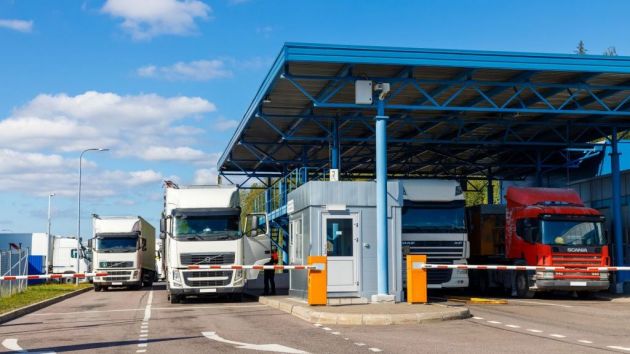Brief History of Logistics - From Ancient Times to Industry 5.0
Source: eKapija
 Tuesday, 06.05.2025.
Tuesday, 06.05.2025.
 22:23
22:23
 Tuesday, 06.05.2025.
Tuesday, 06.05.2025.
 22:23
22:23
(Photo: Museum of New Zealand Te Papa Tongarewa/Unsplash)

The history of logistics dates back to the first human civilizations, when people recognized the need to supply and move goods for survival, Mecalux reports.
The Egyptian Empire (3300 BC to 332 BC) developed transport and storage techniques to maintain a constant supply of food and basic goods. Later, the Roman Empire (27 BC to 476 AD) established an extensive network of land and sea routes, known as the Roman Roads, in order to facilitate the transport of goods and troops across its vast territory. The Romans also pioneered the use of convoy ships for maritime transport, setting up supply depots along their routes.
During that time, trade routes connecting Europe and Asia were established. This facilitated the exchange of knowledge and goods such as metals, fabrics, precious stones and spices between different regions. One of the most famous trade routes, the Silk Road, has become the main trade link between East and West over the centuries.
Origins of Logistics
The concept of logistics, particularly in the military context, was known to ancient Greeks and Romans
when it comes to moving goods and supplies. But it wasn`t until the 18th century that the Prussian general Karl von Clausewitz introduced the concept of that what we call logistics today, and refers to activities related to the supply, transport and maintenance of troops.
In 1811, the author William Miller published Elements of the Science of War. In the "Logistics" chapter, he revealed the strategies which were used by our predecessors to transport and store weapons and food during wartime.
Another widely accepted theory links the word "logistics" to the Swiss general Antoine-Henri Jominy, who was the first to use it in its French form (logistique) in his military treatise Summary of the Art of War (1838).
Historical Development of Logistics
Logistics has evolved significantly over the course of history, adapting to changing social needs and technological advancement.
Antiquity: The origins of logistics can be traced back to Mesopotamia, Egypt, China and Rome. These ancient civilizations devised transport and storage systems to supply the army, the cities and trade. They used wagons, ships and pack animals, establishing strategic routes and storage facilities.
Middle Ages: during this period, artisan associations and trade routes played an essential role in the exchange of goods. Storage and distribution methods were shaped by individual markets.
The Industrial Revolution: 18th century marked a turning point in logistics. The invention of machines, railways and steamships transformed the transport systems, enabling a faster and more efficient flow of goods.
20th Century: logistics became a more formal area of study and research. Mass production, globalization and the adoption of technologies such as the telephone, radio and later the Internet transformed logistics management. Methods such as just-in-time and supply chain management have been introduced.
The Digital Era: With the progress of digital technology and the advent of the information age, logistics underwent fundamental changes. Software was developed for warehouse and transport management, bar codes, RFID technology and real-time tracking and monitoring systems.
Logistics 4.0: Modern logistics, i.e. Logistics 4.0 is based on digitization, artificial intelligence (AI), Internet of Things (IoT), and robotic process automation. Route optimization, use of autonomous vehicles and implementation of automated warehouses are the examples of this new technological era.
Logistics 5.0: following the emergence of Industry 5.0, the term coined by the European Commission, the logistics industry strives to promote additional values vital to its future. These include human well-being, sustainability and resilience. It also encourages the reinforcement of resilience strategies in order to protect the sector from sudden disruptions in the supply chain, such as those caused by the coronavirus pandemic.

Click here to see the entire Special Edition Newsletter
"TRANSPORT AND LOGISTICS - Ready to move the impossible?"
read more
Tags:
logistics
transport and logistics
history of logistics
logistics from ancient times to today
short history of logistics
history in the time of the ancient Romans
special edition newsletters
special edition newsletter Transport and Logistics 2025
TB Transport and logistics The driver of business development
Comments
Your comment
Naš izbor
Most Important News
Full information is available only to commercial users-subscribers and it is necessary to log in.
Follow the news, tenders, grants, legal regulations and reports on our portal.
Registracija na eKapiji vam omogućava pristup potpunim informacijama i dnevnom biltenu
Naš dnevni ekonomski bilten će stizati na vašu mejl adresu krajem svakog radnog dana. Bilteni su personalizovani prema interesovanjima svakog korisnika zasebno,
uz konsultacije sa našim ekspertima.


 Izdanje Srbija
Izdanje Srbija Serbische Ausgabe
Serbische Ausgabe Izdanje BiH
Izdanje BiH Izdanje Crna Gora
Izdanje Crna Gora


 News
News














